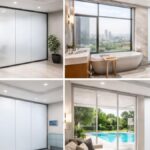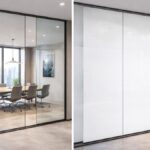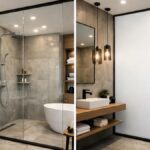Have you ever dreamed of a hotel room where you could control the transparency of your windows with just the touch of a button? Well, dream no more! Switchable glass, also known as smart glass or dynamic glass, is revolutionizing the way luxury hotels approach privacy, energy efficiency, and design. This innovative technology is quickly becoming a must-have feature in high-end accommodations around the world. Let’s dive into how switchable glass in luxury hotels is transforming guest experiences, enhancing privacy, and elevating the overall ambience.
Benefits of Switchable Glass in Luxury Hotels
Explore the myriad advantages that switchable glass brings to high-end accommodations.
Enhanced Privacy for Guests
One of the primary advantages of switchable glass in luxury hotels is the unprecedented level of privacy it offers guests. With the flick of a switch, visitors can instantly transform their transparent bathroom walls or floor-to-ceiling windows into opaque barriers, creating a secluded sanctuary within their room.
Improved Energy Efficiency
This glass isn’t just about privacy; it’s also a powerful tool for energy management. By controlling the amount of light and heat entering a room, hotels can significantly reduce their cooling costs during hot summer months. Conversely, allowing more natural light in during cooler periods can help decrease heating expenses.
Aesthetic Appeal and Modern Design
Let’s face it – this smart glass looks cool. It adds a touch of high-tech sophistication to any space, instantly elevating the perceived luxury of a hotel room. The seamless transition from transparent to opaque creates a sense of magic that never fails to impress guests.
Versatility in Room Functionality
This glass allows hotel rooms to serve multiple functions without compromising on style or space. A transparent bathroom wall can create an open, airy feel when clear, and provide privacy when needed. Similarly, a meeting room can transform from an open, collaborative space to a private boardroom in seconds.
Applications Of Switchable Glass in Luxury Hotels
Let’s explore some notable applications of Switchable Glass in Luxury Hotels:
Bathroom Partitions
Gone are the days of cramped, closed-off hotel bathrooms. These interchangeable glass partitions allow for spacious, open-concept bathrooms that can be instantly privatized when required. This design not only makes the room feel larger but also allows natural light to flow throughout the entire space.
Room Dividers
For suites and larger rooms, these smart glass room dividers offer flexible living spaces. Guests can enjoy an open-plan layout or create separate areas for sleeping, working, or entertaining at will.
External Windows
Perhaps the most dramatic application of switchable glass in luxury hotels is its use in external windows. Imagine waking up to a panoramic city view, then switching the windows to opaque for a midday nap – all without traditional curtains or blinds.
Conference Rooms and Meeting Spaces
In hotel business centres and conference facilities, these smart glass partitions provide adaptable spaces that can be opened up for collaborative sessions or closed off for confidential meetings.
Guest Experience Enhancement
Learn how switchable glass is taking guest satisfaction to new heights in luxury hotels.
Customizable Room Ambiance
This glass puts the power of ambience control directly in the hands of guests. They can adjust the level of natural light and privacy to suit their mood or activities, creating a truly personalized stay.
Improved Natural Light Control
Unlike traditional window coverings, this smart glass allows guests to enjoy natural light while maintaining privacy. This can help regulate circadian rhythms and improve overall well-being during their stay.
Wow Factor and Novelty
Let’s not underestimate the impact of the “wow factor” in luxury hospitality. Switchable glass never fails to impress first-time users, creating memorable experiences that guests are likely to share on social media and with friends.
Sustainability Aspects
Understand the eco-friendly benefits of implementing switchable glass in hotel design.
Energy Savings
As mentioned earlier, the energy-saving potential of switchable glass is significant. By reducing the need for artificial lighting and helping to regulate room temperature, hotels can substantially lower their carbon footprint.
Reduced Need for Curtains and Blinds
This smart glass eliminates or reduces the need for traditional window coverings. This means less fabric to wash and replace, leading to water and resource savings over time.
Longevity and Durability
Quality switchable glass installations can last for many years with proper maintenance. This longevity contributes to the overall sustainability of the hotel, reducing the need for frequent renovations and replacements.
Installation and Maintenance
Get insights into the practical aspects of integrating switchable glass into hotel infrastructure.
- Integration with Existing Structures: Retrofit options are available to seamlessly upgrade existing hotel spaces.
- Cleaning and Upkeep: Requires special care; staff need thorough training to avoid damaging sensitive components.
- Lifespan and Replacement Considerations: Long-lasting but consider potential replacement costs and procedures early on.
- Professional Installation Required: Ensures optimal performance and avoids potential installation issues or malfunctions.
- Electrical System Compatibility: This may require updates to the hotel’s existing electrical infrastructure for functionality.
- Regular Maintenance Checks: Schedule periodic inspections to ensure the glass maintains proper functionality and performance.
- Specialized Repair Services: Have access to specialized repair services in case of unexpected damage or malfunctions.
Cost Considerations
Delve into the financial implications of adopting switchable glass technology in luxury hotels.
- Initial Investment: Higher upfront costs; balance this against long-term benefits and enhanced guest appeal.
- Long-term Savings: Reduces energy costs over time, leading to significant operational savings and efficiency.
- Return on Investment for Hoteliers: Charge premium rates for rooms, boosting guest satisfaction and overall ROI.
- Enhanced Property Value: Can increase the overall value of the property due to advanced, modern features.
- Potential Tax Incentives: Look for possible tax incentives or rebates for incorporating energy-efficient technologies.
- Cost vs. Traditional Upgrades: Compare with other high-tech upgrades to assess the overall financial impact and feasibility.
- Financing Options Available: Explore financing options to manage the initial cost and spread payments over time.
Marketing Potential for Luxury Hotels
Uncover the promotional opportunities that switchable glass presents for luxury accommodations.
- Unique Selling Proposition: Stand out by prominently highlighting this advanced feature in marketing and booking platforms.
- Social Media and Guest Sharing Opportunities: Highly “Instagrammable,” encouraging organic social media buzz and guest sharing.
- Attracts Tech-Savvy Guests: Appeals to guests interested in modern, high-tech amenities and innovative features.
- Prominent Feature in Advertising: Use ads and promotional materials to effectively differentiate from competitors.
- Enhanced Guest Experience: Creates a memorable and luxurious stay, encouraging positive reviews and repeat bookings.
- Exclusive Offers and Packages: Create special offers and packages featuring this technology to attract more bookings.
- Interactive Experiences: Promote interactive experiences, such as personalized settings, to enhance guest engagement and satisfaction.
Conclusion
Switchable Glass in Luxury Hotels is more than just a high-tech gimmick; it’s a transformative technology that’s reshaping the hotel experience. By offering unprecedented control over privacy and natural light, enhancing energy efficiency, and adding a touch of futuristic elegance, switchable glass is fast becoming an expected feature in top-tier accommodations.
The question for luxury hoteliers isn’t whether to adopt this convertible glass technology, but rather how quickly they can integrate it to stay ahead in an increasingly competitive market. As guests become more tech-savvy and environmentally conscious, features like this intelligent glass will play a crucial role in meeting and exceeding their expectations.
So, the next time you check into a luxury hotel and find yourself marveling at a window that changes from clear to opaque at the touch of a button, remember: you’re not just looking at a piece of glass – you’re looking at the future of hospitality.
FAQs
Is switchable glass safe to use in hotel bathrooms?
Yes, It is completely safe for bathroom use. The electrical components are sealed and designed to operate safely in humid environments.
Can one hack or control switchable glass remotely?
High-quality glass systems are designed with security in mind and typically operate on closed circuits, making remote hacking extremely unlikely.
How long does it take for switchable glass to transition from clear to opaque?
The transition time can vary depending on the specific technology used, but it typically ranges from a fraction of a second to a few seconds.
Does switchable glass work during power outages?
Most of the glass defaults to its opaque state during power outages, ensuring guest privacy is maintained even if electricity is lost.
Can guests control the level of tint, or is it just clear and opaque?
While many current systems offer only clear and opaque options, some advanced systems do allow for variable tinting levels, providing more precise control over light and privacy.





